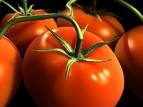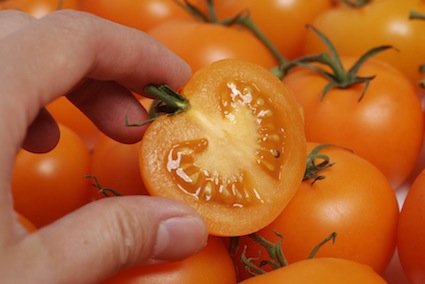- lycopene boosts the elasticity and efficiency of blood vessels, reducing the hardening of the arteries, which occurs with age and improves blood flow
- The supplement used in the study, brand name Ateronon, was shown to improve flexibility of blood vessels by up to 50%.
- Ateronon was shown to dramatically improve the function of the cells of the endothelium, the layer of cells lining the blood vessels, in the group of patients suffering from heart disease.
Tag Archives: tomatoes
Fuss about food – A new series on nutrition
 We are always hearing about the latest superfood, essential fats or good carbs but what do they actually do for you? Every week a new study tells us we should be eating more tomatoes, or how much more important omega 3 oil is than omega 6.
We are always hearing about the latest superfood, essential fats or good carbs but what do they actually do for you? Every week a new study tells us we should be eating more tomatoes, or how much more important omega 3 oil is than omega 6.
Sadly, with each bit of new information we find ourselves just that little bit more confused. In addition to the announcements of what we should be eating each week, there are also regular reports and scare stories on how fat we are all getting.
Diet food is getting us nowhere fast. Levels of obesity are going up as fast as the amount of money we all spend on the latest meal replacement, shake or appetite suppressant. We have also recently been told that extended periods of time on low carbohydrate diets can be extremely damaging for our bodies.
That news is going to be a ‘body’ blow to many of us: the revelation that cutting out carbohydrates was an easy way to a flat stomach meant many of us could get ready for a holiday or wearing a tighter dress in a couple of weeks rather than months.
It is not hard to see where the problem lies If you walk around a supermarket and pick up random items off the shelves, how many ingredients do you actually recognise? Most foods have extra salt and sugar added to them as standard – even so called diet or reduced-calorie foods.
This has a worrying effect on our health and energy levels. The only answer is for us to learn how food affects our bodies on a chemical level. In the coming weeks Elixir will break down each of the superfoods, oils, essential vitamins and magic ingredients into small manageable pieces of information which can help us lead a healthier (and skinnier!) life.
So look out for our future ‘fuss about food’ articles, starting next Monday – we promise you will be an expert on glycaemic load and complex carbohydrates in no time at all. Monday: All the fuss about…. Omega 3
New tomato pill to cut heart disease

London: UK scientists have created a natural supplement made from tomatoes, which they claim when taken daily, prevents heart disease and strokes.
The tomato pill, branded Ateronon, contains lycopene – an antioxidant that blocks “bad” (LDL) cholesterol that chokes the cardiovascular system.
The new lycopene pill is made by a biotechnology spin-out company within Cambridge University, and will eventually go on sale to consumers.
Although research is on-going early trials involving on150 people with heart disease indicate that Ateronon can reduce the oxidation of harmful fats in the blood to almost zero within eight weeks, a meeting of the British Cardiovascular Society will be told at Ateronon’s launch next week.
Neuroscientist Peter Kirkpatrick, who will lead a further research project at Addenbrooke’s Hospital in Cambridge on behalf of Cambridge Theranostics Ltd, said the supplement could be much more effective than statin drugs that are currently used by doctors to treat high cholesterol.
Lycopene is already well-known as a powerful antioxidant which is found in the skin of tomatoes which gives them their red colour. But lycopene ingested in its natural form is poorly absorbed.
Ateronon contains a refined, more readily absorbed version of lycopene that was originally developed by Nestle.
Purple tomato may fight cancer

London: British Scientists have developed purple tomatoes which they hope may be able to keep cancer at bay.
The fruit are rich in an antioxidant pigment called anthocyanin which is thought to have anti-cancer properties, according to a study published in Nature Biotechnology.
A team from the John Innes Centre, Norwich, created the tomatoes by incorporating genes from the snapdragon flower, which is high in anthocyanin.
It was discovered that mice who ate the tomatoes lived longer. This discovery offers the potential to promote health through diet by reducing the impact of chronic disease
Anthocyanins, found in particularly high levels in dark coloured berries such as blackberry, cranberry and chokeberry, have been shown to help significantly slow the growth of colon cancer cells.
They are also thought to offer protection against cardiovascular disease and age-related degenerative diseases.
There is also evidence that the pigments have anti-inflammatory properties, help boost eyesight, and may help stave off obesity and diabetes.
Tomatoes already contain high levels of beneficial antioxidant compounds, such as lycopene and flavonoids.
Leftover spaghetti bolognese cuts cancer risk


New York: Scientists have discovered that multiple rounds of heating left-over spaghetti bolognese with extra oil has extra health benefits.
The technique alters the structure of the main antioxidant in tomotoes – lycopene so that it is more easily absorbed into the body.Previous studies have already shown that making raw tomatoes into purees or sauces increased the benefits.
Study leader Dr Steven Schwartz, from Ohio State University in Columbus, told fellow scientists at the American Chemical Society in Philadelphia.’What we have found is we can take the red tomato molecular form of lycopene and by processing it and heating it in combination with added oil, we can change the shape of the molecule so it is configured in this bent form.’
Heat is vital to the process, but so is the addition of some fat, which helps carry the lycopene through the gut walls.
The scientists processed red tomatoes into two kinds of sauce. One was rich in cislycopene – the ‘bent’ variety – while the other mostly contained all-trans-lycopene, the linear form.
A small study was then conducted on 12 volunteers who were given both types of sauce to eat. After each meal, blood samples-were taken and analysed over nine and a half hours. Lycopene blood levels were 55 per cent higher after consumption of the new sauce, the scientists found.
Can tomatoes fight Alzheimer’s?

Seol: Korean scientists have genetically modified tomatoes to produce a prototype vacinne against Alzheimer’s Disease.
The disease, kills brain cells when a sticky plaque known as beta-amyloid protein clogs up nerve connections.
And the disease, which starts with short-term memory loss and leads to death, is on the increase as people live longer.Current drugs do not prevent or cure it but only slow its progress.
The researchers from the Korea Research Institute of Bioscience and Biotechnology say they have genetically modified the fruit to create an edible vaccine that fires up the immune system to fight the disease.
To create the vaccine, the scientists combined the gene behind the beta-amyloid protein with the tomato’s genetic code.They then used mice to experiment with the designer tomatoes.
Blood samples taken from the mice revealed the tomatoes triggered their immune systems to release disease-fighting antibodies, although the levels of plaques in the brain were not reduced.
They said the tomato was a good way of getting a vaccine into the body because it was enjoyable to eat and could be eaten raw.The vaccine could be destroyed if the tomatoes were cooked, they added.
Tomatoes are already known as a natural antioxidant. They cut cholesterol and may help prevent some cancers (prostate, rectal and colon), protect against sunburn and are packed with vitamin C. The active ingredient is called lycopene which is responsible for the red colour.
Tomatoes help fight blood clots, say scientists
Aberdeen: Tomatoes can help fight deep vein thrombosis, according to an investigation by scientists at the Rowett Institute in the UK.
They have discovered that a yellow fluid around the seeds contains an anti-clotting substance which could help sufferers of the potentially fatal condition.
DVT usually occurs when people are inactive such as sitting for ours on planes and it is thought that as many as 12 per cent of long haul passengers may suffer from clots.
Although aspirin can be helpful some people are allergic to it and others may suffer bleeding in the stomach.
Professor Asim Duttaroy who led the research which has been published in the American Journal of Clinical Nutrition said that tomotoes were entirely safe and the fruit can be used to prevent rather than cure clots.
The anti-clotting substances in the tomato include flavonoids, which are known to help prevent heart attacks and cancer. The substances have already been patented under the name Fruitflow and added to the Sirco brand of fruit drinks. Drinking a quarter of a pint of the juice a day – the equvalent of six tomatoes – will give protection against clots, say the scientists. The benefits last for 18 hours.
The research also revealed that blood ‘stickiness’ was reduced by an average of 70 per cent in 220 volunteers who drank juice containing the tomato extract. Tests showed that in 97 per cent of people the substance changed the thickness of the blood so that it was less likely to clump together as a clot.


